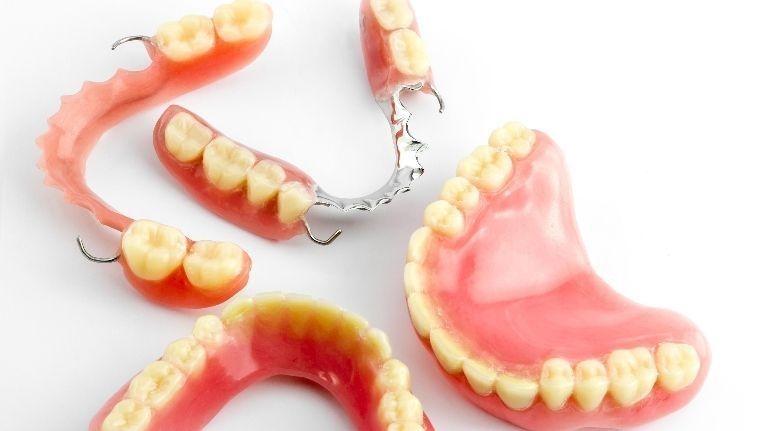
All about dentures
Most people have heard of dentures or “false teeth”. But many people don’t realize what dentures really are, how they work, and what their limitations are. Below I’ll try to explain a little about the types of dentures that are available and how we go about making them.
In this article, I will be discussing full/complete dentures. Full dentures are removable appliances that are made when someone is missing all of their natural teeth in one arch (upper or lower) or both arches. Partial dentures can also be made to replace one or more (but not all) missing teeth in an arch. Obviously when someone loses all of their teeth, it can be very damaging to their self-esteem, as teeth are very important to appearance. In addition, teeth help support the lip and muscles of the face. Without them, people tend to have a collapsed/sunken-in look that creates more wrinkles and makes them appear much older than they really are.
For this reason, making a great set of dentures can have a more profound impact on someone’s appearance than just about any other procedure we do at our office. In one day we can go from someone who is embarrassed to smile or have photos taken to someone who is proud of the way the look and often looks many years younger. With today’s technology, we can recreate someone’s smile from when they were younger or we can even go toward a bright white “Hollywood” smile. Conventional dentures are for people who have either been missing teeth for a long period of time or for people who had their teeth removed and have healed for several months. Doing a conventional denture is the most accurate and predictable way to make a well-fitting set of dentures.
Immediate dentures are for people that still have some or all of their teeth. Immediate dentures are inserted right after the remaining teeth are removed. The advantage is that the patient never has to go without teeth. However, there is some guesswork involved as far as how the gums and bone around the teeth will heal after the teeth are removed. Furthermore, there is considerable shrinkage in the bone/gums over the first few months after teeth are removed. Immediate dentures require a patient to have one or more denture reline procedures done which basically adds more material to the inside of the denture to compensate for the tissue shrinkage.
Overdentures are the third type of full dentures. This is where a patient has dental implants with special connectors that engage and attach to the inside of the denture to keep it from moving. The implants also help to preserve the bone where the teeth used to be.
All dentures at our office are custom-made for each patient. We make impressions/ molds of your gums and any remaining teeth so that the dentures will fit well. We then take certain measurements to make sure that the denture teeth are the right size for your face and bite and that the denture makes your facial profile look good. The dentures are made at a local dental laboratory out of a special kind of colored acrylic that fits over the gums with natural looking resin teeth on top. Patients who are having conventional dentures made can even try in a wax set of dentures so that they can be sure they are happy with their appearance before the final set is made.
There is definitely an adjustment period for people who are transitioning from natural teeth to dentures. It can take several weeks or more for your tongue and other facial muscles to learn how to speak and eat with the dentures in place. It’s not unusual to experience an increase in salivary flow with new dentures and to also experience soreness in the tongue, lips, or cheek. At our office, we give our patients lots of ideas and help to get them through this transition period and we tell them we expect to see them a few times for adjustments.
Most patients find that it is easier to adapt to an upper denture than a lower denture. This is mainly due to anatomy, as upper dentures can get better suction across the roof of the mouth. The lower denture has to contend with the tongue, which is constantly moving during eating and talking.
It is important to maintain good oral hygiene even if you have lost all of your teeth. We recommend that our patients take out their dentures every night and brush/clean them thoroughly with special denture brushes and cleaners. Dentures should be left out overnight and kept in water. Gums and the roof of mouth should also be gently brushed to help minimize irritation and smells.
Dentures still require maintenance. They will loosen over time because the gum and bone tissue where the teeth used to be will continue to shrink for the rest of your life. Denture teeth will get worn over time, which can affect chewing ability as well as appearance. It is good to see a dentist periodically to have them examine the health of your oral tissues and to check the condition of the denture.

